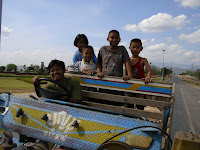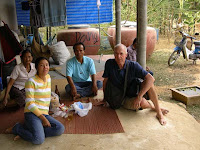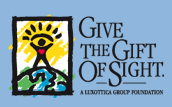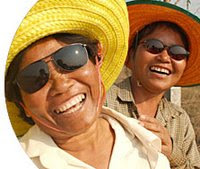
Ah, for the simple life...
by
Edgar Allen Beem
as seen in
The Forecaster,
a Portland area weekly
Nov 29, 2007
As we begin to freeze in place for the winter, that familiar old escapist fantasy starts percolating in my aging brrrain again. No, it’s not the one about becoming a beachcomber on an island in the Caribbean, though it is related. It’s that fantasy about simplifying my life, unplugging myself from the electronic maze and breaking free of the comfortable consumer attachments that entangle us all.
It starts when I wake in the dark to hear the furnace purring in the basement and the heating pipes signaling their expansive (and expensive) warmth with a chorus of metallic creaks and clicks. As my bare feet touch the cold floor I have to resist the urge to turn the thermostat up from 62 to something more temperate. It’s not that I’m cheap or poor; it’s just that even in my denatured suburban state of being I have this elemental ethical sense that when it’s cold you should know it’s cold. Barefoot in November is a luxury none of us can afford.
I do wish I didn’t have to pay fuel bills, gas bills, phone bills, cable TV bills, Internet bills, insurance premiums, car payments, education loan payments and the mortgage, but it’s not so much the money that bothers me as the dependency. (The money does, however, bother Carolyn, who actually writes the checks and must be avoided whenever she is paying bills.) Could I live without an automobile? Could we live without two?

In my escapist fantasy, I live in a cabin in the woods. (At the moment I am eying the garden shed in the backyard as a potential abode.) I walk wherever I need to go, burn wood in a little stove, haul water from a stream, write by hand and read by candlelight. It’s a Thoreauvian existence, close to nature, free of any illusions of security. There are no bills to pay, no e-mails to send or reply to, no telephone calls to answer or make, not even any mail. If you want to talk to me, you have to come to where I am and speak with me face-to-face.
In my fantasy life, I am something of a hermit. I am hairy, unshaven and foul smelling (all of which is probably true in my real life as well.) I’m a bit odd, but perfectly harmless (ditto.) I eat only what I can grow, gather or kill. I am self-sufficient.
I am also in denial. I can only imagine what Carolyn, who is away visiting her sister in Massachusetts, would say if she were reading this over my shoulder.
"A cabin in the woods? You won’t even go camping with us, you jerk!"
True. And I don’t hunt or fish. For that matter, I don’t do any gardening other than a little weeding around Carolyn’s basil and tomatoes. Carolyn, who comes from sturdy Polish peasant stock, could probably live the life I am imagining, but I couldn’t. I’d last about an hour and half alone in the wilderness.
I would like to believe, however, that I could eliminate some of the encumbrances from my badly compromised life. If I can’t drip out, maybe I can downsize. I’m just not sure where to start. Maybe we could try getting along with one car. I dimly recall eking out a meager living as a writer through the mails, but I’m not sure magazine and newspaper editors would know what to do with a paper manuscript anymore. Come to think of it, I’m not even sure where I’d get typewriter ribbons these days. I have the feeling I might read more if we got rid of the television, but then how would I watch the Red Sox and the Patriots? (That was one of the issues I hadn’t quite worked out when I was living as a hermit in the woods. A transistor radio maybe?)
Obviously, I am making light of the fact that I am completely unprepared, physically and psychologically, to live the simple life I philosophically imagine for myself, yet the urge is real nonetheless. Like most Americans, I have sacrificed far too much to comfort and convenience and the illusion of permanence. That is why I keep a snapshot of a Buddhist monk tacked on the bookshelf above my desk.

Thuy Giac Than was a Vietnamese monk in Thich Nhat Hanh’s Order of Interbeing. I visited with him quite often when he was living at the Maple Forest Monastery in Vermont. Thuy Giac Than was about my age and I saw in him my better self, my higher nature. He owned nothing but his robe and sandals. He lived entirely in the moment. He was ill when I first met him and he died a year or two later. Even as I indulge myself, materially and metaphorically, I am ever mindful of something Thuy Giac Than said a few months before he passed away."
"The emptier I get,” he told me, “the happier I become."
Words to live by – if I only knew how. No, I take that back. I do know how. We all know how. We just lack the will.
[End of article.]
 Today I went to a fun Christmas/New Year's get-together at House of Thai Thai Coffee which serves the best cappucino I've ever tasted. The gathering consisted of some of the staff and family, a few Thai instructors, some of their students and a few loyal customers - I think around 22 people. We had delicious Gaaeng Kiiao Waan Gai
Today I went to a fun Christmas/New Year's get-together at House of Thai Thai Coffee which serves the best cappucino I've ever tasted. The gathering consisted of some of the staff and family, a few Thai instructors, some of their students and a few loyal customers - I think around 22 people. We had delicious Gaaeng Kiiao Waan Gai  We brought small gifts (100 Baht or about $3) and drew numbers, presenting the gift to the person who drew our number with sà-wát-dii bpii mài (Happy New Year). We each introduced ourselves to the group - in paasaa thai (Thai Language), sharing name, where we were from, how long in Chiang Mai and what we were doing there. chăn chêuu Gail, chăn bpen kon American, phák yuu thîi nîi nai Chiang Mai sii deuuan, bpen aa-jaan gày-sĕe-yon láao, phák róorn bpai tîao láe gamlang khìían nãng-sèúua. I have no idea how many people understood me - but I knew what I was saying.
We brought small gifts (100 Baht or about $3) and drew numbers, presenting the gift to the person who drew our number with sà-wát-dii bpii mài (Happy New Year). We each introduced ourselves to the group - in paasaa thai (Thai Language), sharing name, where we were from, how long in Chiang Mai and what we were doing there. chăn chêuu Gail, chăn bpen kon American, phák yuu thîi nîi nai Chiang Mai sii deuuan, bpen aa-jaan gày-sĕe-yon láao, phák róorn bpai tîao láe gamlang khìían nãng-sèúua. I have no idea how many people understood me - but I knew what I was saying. Thai Thai Coffee is a combination of three excellent litle businesses - coffee bar, language center and Thai Culture/Adventure touring.
Thai Thai Coffee is a combination of three excellent litle businesses - coffee bar, language center and Thai Culture/Adventure touring.





.jpg)






























